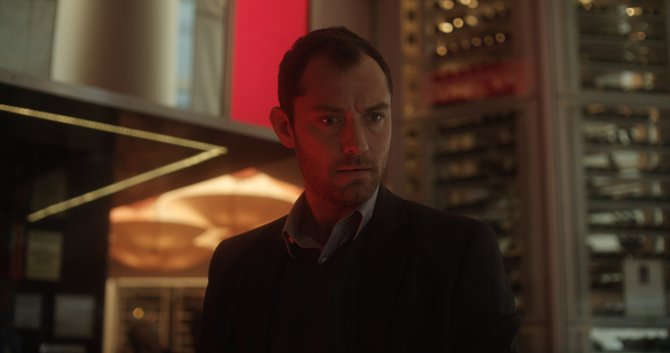Dr. Jonathan Banks (Jude Law) searches for answers for his patient’s ailments with a controversial drug in “Side Effects.” Photo by Courtesy Di Bonaventura Pictures
"Side Effects" is a decent story. Despite the dry title, which suggests secondary ailments associated with but not necessarily caused by prescription drugs, the film twists issues of mental health, depression, suicidal ideation, therapeutic pharmacological agents and business pressures faced by prescribing doctors into a mind-riddling thriller.
The different pieces of the puzzle fit snuggly together by the end--perhaps too snuggly, like a cinematic wedgie crushing out the avant-garde for a predictable tale of greed, jealously and lust.
The film, directed by Steven Soderbergh and written by Scott Z. Burns, captures the feeling of a cloudy day. As opening credits roll, the camera languishes on an austere building, forewarning us that this ain't going to be one of them pretty pictures.
The glossiest film Soderbergh made was "Ocean's Eleven." The "Ocean's" trilogy had visual snap, complementing cool wit and an outrageously handsome cast. "Magic Mike," also under Soderbergh's direction, had cabaret charms and a biting sense of humor.
When serious issues drive the story, such as in "Traffic," "Erin Brockovich" and "Contagion," Soderbergh focuses on ugly realism. But that realism cracks apart in "Side Effects." The mental twists distort our perspective from understanding what's real and what isn't. And the interesting social commentary on the pharmaceutical industry eventually takes a back seat to clever obfuscation.
Wistful music with the quality of a soft breeze draws us into a Manhattan apartment. A wooden sailboat and a small envelope lay on a chair. A trail of blood mars the floor.
The movie rewinds to three months earlier. Emily Taylor (Rooney Mara), a thin, nervous woman, waits for her husband Martin's release from prison. Her mother-in-law (Ann Dowd) sits by her side. Martin (Channing Tatum) served four years for insider trading, and he's ready to jump start their lives and recapture his fortune.
But Emily can't stop crying. She's an emotional wreck, living in a fog of hopelessness. She guns her car into a concrete wall, and the suicide attempt gets the attention of Dr. Jonathan Banks (Jude Law). Banks wears an air of Sunday-suit formality: He's proper, not the type to be involved in a scandal. After consulting with Emily's previous therapist (Catherine Zeta-Jones), Banks prescribes Ablixa.
"This drug makes it easier for you to be who you are," he explains. But the medication has side effects, which may or may not be a central concern. As Banks searches for answers to Emily's problems, his clinical investigation transitions into a forensic whodunit.
Soderbergh casts actors with the ability to bring characters up and out of themselves, and then encourages them to trust themselves and each other. Each character here is an original. Rooney Mara's Emily wanders off in her head and loses track of what's going on around her. She needs a keeper, and she finds one in Jude Law's steady and optimistic Banks. As Banks unravels the threads, his professional and personal life disintegrates into a tumultuous nightmare. Catherine Zeta-Jones provides an intense foil to Banks; through thick glasses, her penetrating glare notes his every misstep.
"Side Effects" sustains the tension for a good chunk of the film. The shortcoming is that the cliches of the psychological thriller genre crack open by the end. The solution provides too much coherence. The movie doesn't quite pay off the way we expect a thriller to do - in thrills. Instead, it pays off in atmosphere and the greedy ordinariness of evil at play. Soderbergh works imaginatively in the detail; what he lacks here is a low cunning.



Comments
Use the comment form below to begin a discussion about this content.
comments powered by Disqus